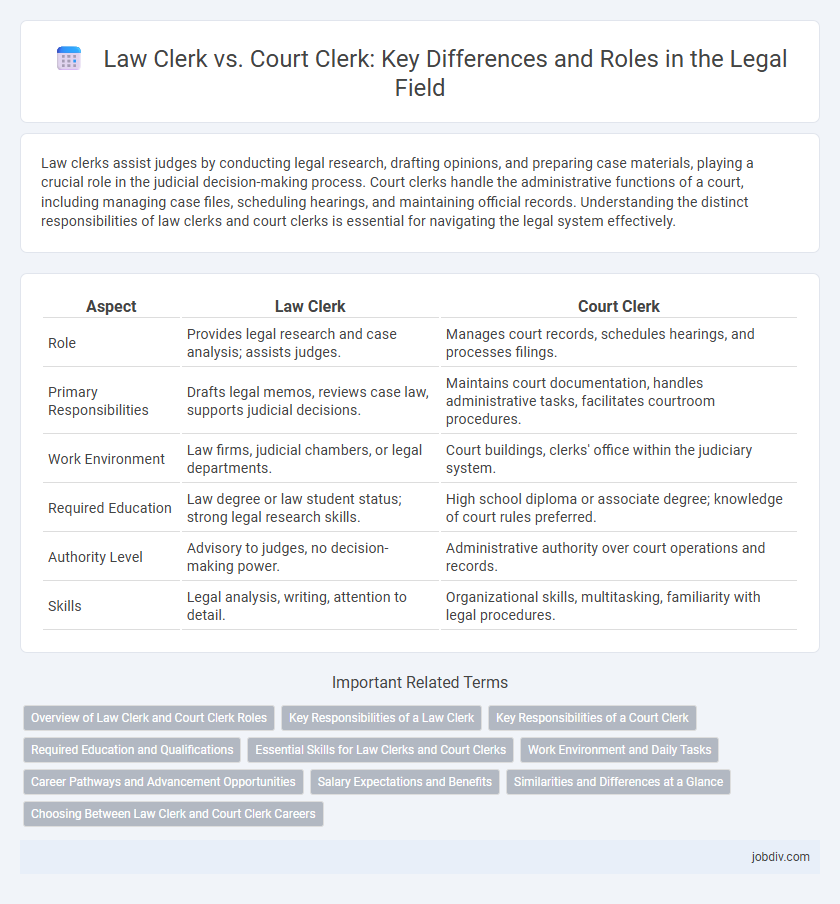Law clerks assist judges by conducting legal research, drafting opinions, and preparing case materials, playing a crucial role in the judicial decision-making process. Court clerks handle the administrative functions of a court, including managing case files, scheduling hearings, and maintaining official records. Understanding the distinct responsibilities of law clerks and court clerks is essential for navigating the legal system effectively.
Table of Comparison
| Aspect | Law Clerk | Court Clerk |
|---|---|---|
| Role | Provides legal research and case analysis; assists judges. | Manages court records, schedules hearings, and processes filings. |
| Primary Responsibilities | Drafts legal memos, reviews case law, supports judicial decisions. | Maintains court documentation, handles administrative tasks, facilitates courtroom procedures. |
| Work Environment | Law firms, judicial chambers, or legal departments. | Court buildings, clerks' office within the judiciary system. |
| Required Education | Law degree or law student status; strong legal research skills. | High school diploma or associate degree; knowledge of court rules preferred. |
| Authority Level | Advisory to judges, no decision-making power. | Administrative authority over court operations and records. |
| Skills | Legal analysis, writing, attention to detail. | Organizational skills, multitasking, familiarity with legal procedures. |
Overview of Law Clerk and Court Clerk Roles
Law clerks provide critical legal research, draft memos, and assist judges with case preparation, typically requiring a legal education or law school enrollment. Court clerks manage administrative functions within the courtroom, including maintaining court records, swearing in witnesses, and handling case filings. Both roles support the judicial process but differ significantly in responsibilities, with law clerks focusing on legal analysis and court clerks on procedural and clerical duties.
Key Responsibilities of a Law Clerk
Law clerks conduct extensive legal research, analyze case law, and draft memoranda to assist judges in decision-making. They review case files, prepare legal documents, and summarize depositions or trial transcripts to facilitate judicial review. Their role is pivotal in supporting the judicial process by ensuring that judges have accurate and comprehensive legal information.
Key Responsibilities of a Court Clerk
A court clerk manages the administrative functions of the courtroom, including maintaining accurate records of court proceedings, processing legal documents, and managing case files. They coordinate schedules for hearings, assist judges by preparing dockets, and ensure compliance with court rules and procedures. Court clerks also handle communication between the court, attorneys, and the public, facilitating smooth courtroom operations.
Required Education and Qualifications
Law clerks typically require a Juris Doctor (JD) degree or must be law students actively enrolled in a law school program, often seeking hands-on experience in legal research and drafting. Court clerks usually need a high school diploma or equivalent, with many positions preferring candidates who have completed associate degrees or coursework in legal studies, office administration, or related fields. Both roles benefit from strong organizational skills, but law clerks emphasize legal knowledge while court clerks focus on administrative expertise.
Essential Skills for Law Clerks and Court Clerks
Law clerks require strong legal research and analytical skills to assist judges in drafting opinions and preparing case materials, while court clerks must possess excellent organizational and administrative abilities for managing court records, schedules, and facilitating courtroom operations. Proficiency in legal terminology, attention to detail, and effective communication are crucial for both roles, enabling accurate interpretation and relaying of court procedures. Mastery of case management software and understanding of courtroom protocols further distinguish their essential skill sets within the legal system.
Work Environment and Daily Tasks
Law clerks primarily operate within judicial chambers or law firms, conducting legal research, drafting memos, and assisting judges in case preparation. Court clerks work in courthouse settings, managing administrative duties such as maintaining court records, scheduling hearings, and facilitating communication between judges, attorneys, and the public. The law clerk's role emphasizes analytical and writing skills, while the court clerk focuses on organizational and clerical tasks essential to court operations.
Career Pathways and Advancement Opportunities
Law Clerks typically advance by gaining experience in legal research and drafting, often moving toward roles as attorneys or legal analysts, benefiting from internships or clerkships with judges. Court Clerks pursue career growth through administrative expertise, with opportunities to become senior court clerks, court administrators, or compliance officers by mastering courtroom procedures and case management systems. Both career paths require specialized skills, but Law Clerks focus on legal scholarship while Court Clerks emphasize court operations and administration.
Salary Expectations and Benefits
Law clerks typically earn an average salary ranging from $50,000 to $70,000 annually, reflecting their specialized legal research and drafting responsibilities. Court clerks usually have a lower salary range, approximately $40,000 to $60,000, focusing on administrative duties within the courthouse. Benefits for both positions often include health insurance, retirement plans, and paid leave, though law clerk roles may offer additional opportunities for professional development and bar exam support.
Similarities and Differences at a Glance
Law clerks and court clerks both play crucial roles within the judicial system, supporting the functioning of courts and legal proceedings. Law clerks primarily assist judges by conducting legal research, drafting opinions, and preparing case briefs, whereas court clerks handle administrative tasks such as managing court records, scheduling hearings, and processing legal documents. While both positions require a strong understanding of legal processes, law clerks typically possess advanced legal education, often being law students or graduates, unlike court clerks who focus more on clerical and organizational skills.
Choosing Between Law Clerk and Court Clerk Careers
Choosing between law clerk and court clerk careers depends on your interest in legal research or administrative court operations. Law clerks primarily assist judges by conducting in-depth legal analysis and drafting opinions, requiring strong research and writing skills. Court clerks manage case files, maintain court records, and facilitate courtroom procedures, emphasizing organizational abilities and direct interaction with courtroom staff.
Law Clerk vs Court Clerk Infographic

 jobdiv.com
jobdiv.com